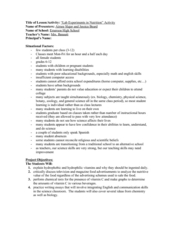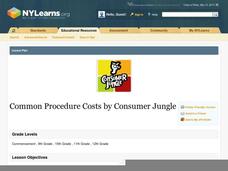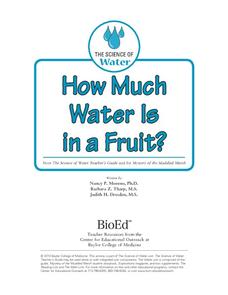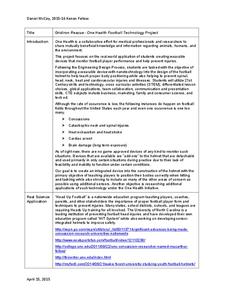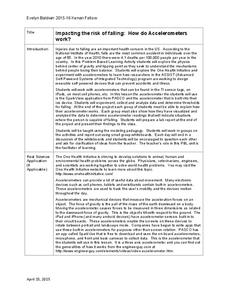Curated OER
Lab Experiments in Nutrition Activity
Which vitamins should be ingested daily for maximum nutrition? Learners with ispecial needs or those who are pregnant focused on television and magazines advertisements that are used to sell food products. They conduct experiments and...
Curated OER
Common Procedure Costs
Kids never think about the cost of medical expenses, because they never think they'll get hurt. To better understand personal financial planning, learners research common medical procedures and their costs. They use a worksheet and the...
Curated OER
Child Safety
Explore reading comprehension and child safety in this young adult literacy lesson. High schoolers practice using context clues to figure out word meanings after observing a teacher model this process. They read an article about child...
Curated OER
My Personal Wellness
Merge technology and wellness. Class members complete inquiry-based research on a personal wellness issue and create an annotated bibliography, uploading their completed work to their personal wellness websites. Prior to beginning, your...
Baylor College
How Much Water Is in a Fruit?
Compare the volume of an orange to the volume of liquid that can be extracted out of it. Also compare the mass of an apple before and after it has been dried out. In both of these activities, children find that there is an appreciable...
Baylor College
How Much Water Do Humans Need?
Physical or life science learners measure the amounts of water eliminated by intestines and the urinary system, and the amounts lost via respiration and perspiration. In doing so, they discover that the body's water must be replenished...
Baylor College
What's Is Soil Made Of?
It's time to roll up those sleeves and get a little dirty in the second lesson of this series on the science of food. Investigate where plants and animals get the minerals they need to live in this two-part exploration of soil. First,...
Baylor College
Plant Parts You Eat
Plants provide a variety of delicious foods essential for human survival. In the fourth lesson of this series on food science, young scientists investigate common fruits, vegetables, and grains in order to determine which plant part is...
Baylor College
Bio Build-up
Trace pollutants through the environment in the seventh lesson of this series on the science of food. Looking at a picture of the plants and animals in an aquatic ecosystem, learners use dot stickers to represent harmful chemicals as...
Baylor College
They're Everywhere: Bacteria
Totally gross out your class with the eighth instructional activity in this series on food science. Explore the microscopic world of bacteria by taking swabs of different classroom objects and growing colonies in petri dishes. An...
Baylor College
What's That Food?
Get things cooking with the first lesson plan in this series on the science of food. Working in small groups, young scientists make and record observations about different mystery foods. These descriptions are then shared with the class...
Baylor College
Healthy Snacks
Assess your pupils' ability to identify healthy food choices in the final lesson of this series on food science. Given five different food labels, young nutritionists will rank them from most to least healthy, supporting their choices...
Baylor College
Using Food Labels
Help your class make sense of nutrition labels with the ninth instructional activity of this series. After explaining the different information provided on packaged food labels, perform an activity that demonstrates the amount of sugar...
Baylor College
Food for Kids
Immediately capture the attention of your class with the smell of freshly popped popcorn in the sixth instructional activity of this series on the needs of living things. Young scientists first use their senses to make and record...
Baylor College
Healthy Homes
Meant to follow a lesson about how concentrated air particles can be inside of a building, this resource gets individuals to assess the possible air pollutants in their own homes. They take home a worksheet and circle spots on it that...
Baylor College
Food: The Math Link
Enrich your study of food science with with these math worksheets. They offer a variety of food-related word problems that are great practice for multiplying, identifying fractions, estimating length, and performing calculations with...
King Country
Lesson 4: Relationships - Day 2: Gender Identification
Gender roles and gender identity are the focus of a lesson plan designed for high school special education classes. Read the introduction to the packet carefully, as it contains advice about how to approach the subject with your classes.
Food a Fact of Life
Back to Basics
Ratatouille, the sauce not the animated Disney film, is the focus of this foods lesson plan. Class groups prepare either a classic tomato ragu or a ratatouille to take home and share with their families.
Council for the Curriculum, Examinations and Assessment
Health and the Whole Person
The first lesson of the unit introduces class members to the social, physical, emotional, cognitive, and spiritual constituent elements of health and the need for balance among these elements. Class members used the provided assessment...
Council for the Curriculum, Examinations and Assessment
Relationships and Sexuality
Developing close personal and romantic relationships requires its own set of skills. This session focuses on helping teens develop behaviors and strategies for dealing with romantic relationships, rather than on sharing personal...
National Library of Medicine
Your Environment, Your Health: The Great Debate—Bottled Water vs. Tap Water in Our School
Should bottled water be sold in schools, or should they only provide tap water? The summative unit in the six-part series encourages scholars debating this topic. The lessons teach how to build an argument, how to gain background...
American Psychological Association
Childhood Obesity
The United States leads the world in the percentage of obese adults and children. Why? What can be done about the problem? High school psychology classes adopt a problem-focused approach to investigating childhood obesity and then...
Kenan Fellows
Gridiron Rescue: One Health Football Technology Project
Helmets not included! Scholars brainstorm adjustments and sensors to football helmets in an engineering design project to help prevent injuries, such as concussions and spinal injuries.
Kenan Fellows
Impacting the Risk of Falling: How Do Accelerometers Work?
Young engineers consider how to apply accelerometers and sensors to help prevent falls in elderly people. They consider forces of motion and gravity as part of the engineering design process.
Other popular searches
- Fairness and Integrity
- Honesty Integrity
- Academic Integrity
- Novel Study Integrity
- Lesson Plans on Integrity
- Sexual Integrity
- Integrity Cheating
- Integrity Lesson
- Kindness. Integrity
- Intellectual Integrity
- Personal Integrity
- Work Ethic Honesty Integrity


